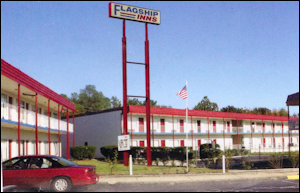
Flagship Inn, Petersburg
Two Sundays ago the Richmond Times-Dispatch ran a disturbing special report on poverty and housing insecurity along the Jefferson Davis Highway in Chesterfield County. Hundreds of people live in shabby motels, paying $200 or more per week to live in conditions almost as deplorable as Richmond’s public housing projects. These hotels, the housing equivalent of pawn shops and payday lenders, serve the poor and the desperate who have nowhere else to turn. It is depressing to think that people live this way.
People pay huge sums — $200 per week translates into more than $800 per month, enough to rent a nice, two-room apartment in a decent neighborhood — to dwell amidst deplorable conditions. Many hotel rooms have roaches, bedbugs and other insect infestations. The article cites leaking sewage, mold, mice droppings, and inoperable door locks. Conditions sound similar to those of the public housing projects — without the same level of crime.
The plight of some of the residents is truly pitiable. Latisha Ragland, a single mother with three children, lives in the Flagship Inn in Petersburg. The 39-year-old had most of her right leg amputated because of complications from diabetes and high blood pressure. She receives dialysis three times a week, and is waiting for a kidney transplant. She receives $735 a month in disabilities benefits but spends $220 a week for rent. Any unexpected expense is devastating. Stressful insecurity adds to the misery of her circumstances.
It seems absurd that someone must pay the equivalent of nearly $950 per month in rent (4.3 weeks per month x $220) for a literally lousy hotel room. The article prompts the question of why tenants have to pay so much. Are people like Ragland being exploited by greedy motel landlords?
That’s hard to say because landlords would not talk to the reporters. The lawyer for one responded, “There’s plenty of other hotels. Obviously, it’s not that bad or she would leave.” That’s not much of an answer.
But there are hints in the special report as to why the rents are so high. People who live in hotel rooms come only when they can’t find housing anywhere else. Other than living in a tent in the woods, this is truly housing of last resort. Who are these people? For the most part, they live hand-to-mouth and have terrible credit. Who would pay $950 per month if they could qualify to rent their own apartment?
Evidently, some tenants fail to pay their rent. Consider the predicament of the landlord. Anyone who stays at a motel for longer than 90 days has rights under the Landlord-Tentant Act. Landlords can evict clients for non-payment only after giving them a reprieve to allow them to come up with the money, and only after a court proceeding. Sometimes unpaid rent can accumulate to substantial sums.
The T-D cites the situation of Trimaine Reed, living at the America’s Best Value Inn, who took the motel to court after living with cockroaches for three years. In return, the motel tried to remove her for failing to pay $4,016 in rent. The judge ruled against her, she claimed, because she had forgotten the paperwork laying out her defense.
The larger point is not whether Reed was fairly or unfairly evicted. The point is that motel owners are dealing with clients with terrible credit quality who frequently fail to pay their rent. Motel owners either eat the lost rent or attorneys to collect it in court. In either case, they bear a substantial cost which must be compensated for by charging what seems to be unconscionably high rents. The situation is directly analogous to payday lenders who charge what seem to be unconscionably high interest rates to clients with a high propensity for default.
What is to be done? How does society at large deal with the heart-breaking stories of people who live in these motels? Cracking down on the motels does not seem to be a viable option. Driving the motels out of business will leave the tenants with no place to live. Some say Chesterfield County should encourage more affordable housing by requiring developers to add affordable-housing units as a condition of development. That’s fine if you’re OK with wealth transfers from the middle-class to a lucky few who qualify for those apartments; regardless, the lucky few won’t come from the ranks of the motel people because landlords would accept only lower-income tenants with the very best credit. Another option mentioned by the T-D is to create rental subsidy program funded in part by the county. That’s fine if you’re OK with tapping middle-class taxpayers.
None of the traditional remedies look good. But let me throw out an idea. There does seem to be an opportunity to create a charity-based enterprise. Because of their poor credit, motel tenants are paying outrageous sums for terrible living conditions. Address the credit issue, and a charitable entity can get the motel people into better housing at lower rents. Perhaps a charitable enterprise could bundle a couple hundred of these people, in effect pooling the risk and functioning as a co-signor so tenants can qualify for better housing under more favorable terms. Inevitably, some clients would default and the charitable entity would have to eat some bad debt, so it would be necessary to inject some charitable capital or public housing funds to maintain solvency. But in theory, tenants will be at lower risk of falling behind on their rent because they will be paying a significantly smaller percentage of their income. It’s an idea worth noodling.


